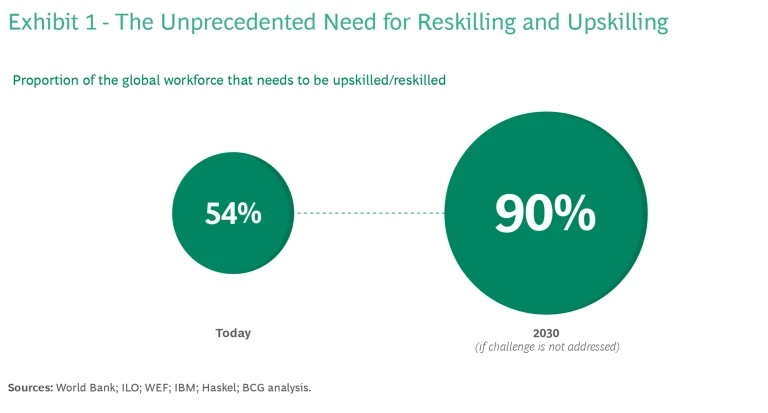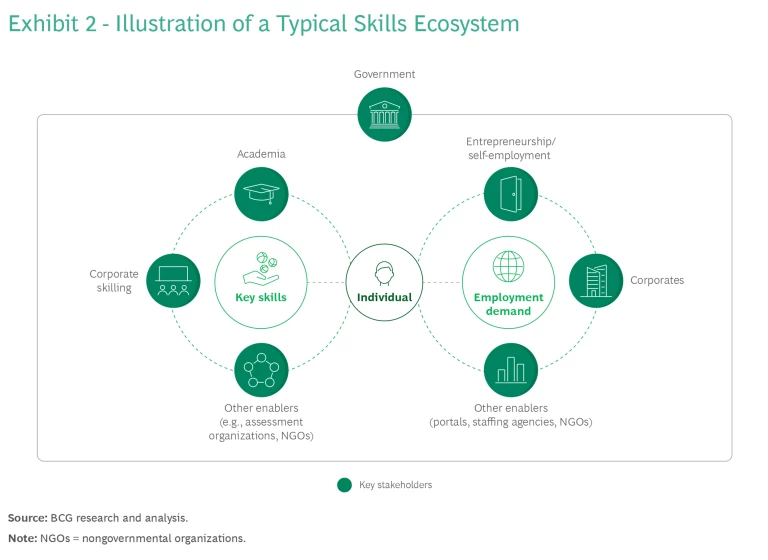Governments around the world are grappling with a significant skills gap in their national workforces. Fifty percent of today’s global working population needs to upskill or reskill to stay competitive; by 2030, the World Economic Forum projects this will grow to 90%. (See Exhibit 1.) Failure to address this issue could result in a staggering global GDP loss of up to US$15 trillion by 2030 .

Key stakeholders have invested significant sums to address this challenge, however, current solutions continue to fall short. Corporate programs fail to reach 70% of small company and informal economy workers, according to BCG research and analysis. Academic institutions aren’t prepared to accommodate millions returning to school and tend to offer disconnected and lengthy programs. Online education has limited accessibility, leading to low completion rates. And public- and nonprofit-driven efforts often lack industry alignment. The result of these shortcomings is an inability to create impact at scale.
Governments are uniquely positioned to address the fundamental challenges in the market that have contributed to the current crisis. To so effectively, governments must play a crucial role as orchestrators of the skills ecosystem. Based on our research into more than 80 global skills ecosystems and 10 government-based interventions, alongside conversations with skilling experts, we propose three strategies for governments and policymakers to create a thriving skills ecosystem in their countries.
Why the Current Skills Ecosystem Is Broken
On the demand side of the skills ecosystem are participants like industry and companies, as well as key enablers like staffing agencies and job portals. On the supply side, key stakeholders include training providers (corporates and academia) that enable skill development in collaboration with other supporting organizations, such as assessment agencies that evaluate and certify candidate proficiency. Governments typically play the role of facilitator, guiding these ecosystems to ensure alignment and success. For example, governments may provide funding and resources to individual training programs, making it easier for people to access skill-building courses. (See Exhibit 2.)

But today, in many countries, these ecosystems aren’t working. Their dysfunction primarily results from four significant market challenges.
Information Asymmetry. Inadequate information within the system leads to subpar decision making. For example, individuals lack job and skill information, often relying on ad hoc data and insights from peers or the internet to guide them; companies face challenges in candidate discovery, credential verification, and making informed recruitment choices; and governments encounter information gaps when forecasting skills demand because of the labor and skills market’s speed and complexity.
Coordination Failures. These arise when stakeholders are unable to collaborate systematically; for example, when educational institutions train workers in skills that are irrelevant to industry needs or when governments allocate disproportionate funds to certain sectors. This results in a mismatch between the skills being taught and industry needs, fragmented training programs, and a lack of standardized credentials.
Present Bias. This phenomenon has undue influence on skilling. Individuals tend to procrastinate when it comes to skilling because they don’t see immediate benefits. Companies deprioritize skilling because of short-term financial pressures and unclear return on investment. Governments face similar issues due to short political cycles, conflicting priorities, and budget constraints. For instance, funding may favor immediate gains rather than sustained education reforms.
Externalities. These occur when, for example, an employer trains an employee who then leaves the company; another company would reap the benefit from that investment into training. The spillover effect raises concerns about employers being hesitant to invest the necessary funds in skills development, as they may anticipate others benefiting without directly contributing to the investment. This phenomenon is particularly acute in resource-constrained micro- and small enterprises, as well as the unemployed workforce where access to even basic employability or entrepreneurship skills becomes difficult.
The Government as Ecosystem Orchestrator
When researching skilling ecosystems around the world, we found time and again that the critical factor contributing to these market challenges is a lack of orchestration. This, we believe, is where governments are uniquely positioned to move from their role as facilitators to become more proactive and strategic orchestrators. Three interventions are key.
Build an open and comprehensive digital skills platform to bridge information asymmetry and improve coordination. Through this intervention, governments can address challenges with respect to information asymmetry and coordination failures by providing transparent access to up-to-date information and bringing all stakeholders to one common platform.
Individuals can use such a platform to find jobs, skill programs, and funding options, and employers can use it to search for candidates. Training providers can use the platform to receive accreditation or market their programs. Financiers can list potential funding/financing offers on the portal to provide improved access to grants and scholarships. Governments do not necessarily have to create all the services offered on the platform themselves. Instead, they can establish an interoperable technology design, encouraging collaboration with developers.
Governments should also look for ways to incorporate AI (including generative AI) into the platform to improve the user experience and enhance offerings, including:
- Real-time labor market insights that identify emerging skill demands and job trends, helping individuals and employers make informed decisions
- Predictive workforce planning that aligns skill development efforts with upcoming job demand
- Skills authentication and proficiency through automated assessments, certification, expedited credential verification, and digital badges
- Significantly improved candidate search process for organizations with expedited access to candidate performance and proficiency
- Personalized learning strategy and content based on individual needs and preferences
- Personalized coaching from AI tutors and counselors to help candidates and other stakeholders navigate their respective journeys
Many governments are already pursuing digital initiatives. The French government has created Mon Compte Formation—a digital platform for vocational training and skills development. It allows individual employees and jobseekers to access a personal training account that includes government, employer, and personal contributions. Users can search for online and in-person training courses from a catalogue of providers and can also access career guidance when choosing a program. Further, the platform aggregates potential sources of corporate and government funds to help individuals finance their course costs.
India, through the National Skill Development Corporation (NSDC), has introduced Skill India Digital, which will include a platform that incorporates functionalities such as recommendation engines, digitally verified credentials, and a job exchange.
And in Saudi Arabia, the government launched its national skilling stimulus program, Waad (The Promise), and is rolling out a digital national skills platform connecting employers, employees, and eligible training providers. This platform is intended to serve as a one-stop shop for citizens’ skilling needs and provides comprehensive career guidance tools.
Enable lifelong investments in skilling by incentivizing behavior change among key stakeholders. Through this intervention, governments can address present bias and externalities by helping individuals, companies, and academia to make critical shifts in their approach to skilling.
Individuals: from passive learning to lifelong learning. Individuals predominantly invest in learning during their first 20 years, but lifelong learning and skill building is essential for competitiveness, employability, and quality of life. To help people embrace this mindset, governments can provide:
- Policy provisions for paid educational leave to pursue training from certified providers
- Lifelong education credit or vouchers for adults to apply toward skilling programs
- Individual learning accounts to track an individual’s skilling journey, such as the funding they have available and have used to date and documentation of training progress over time
Singapore’s SkillsFuture initiative, targeting those aged 25 and above, provides a $SG 500 SkillsFuture Credit for individuals. In Germany, residents in 14 out of 16 federal states can access five days of paid annual upskilling leave for accredited training. The assistance upskilling checks vary by state, offer financial assistance, often up to €1,000 or 50% of training expenses. Saudi Arabia has allocated more than SAR 1.3 billion to sponsor upskilling through its national skills platform.
Companies: from reactive human resource management to proactive skill capital development. Companies face continuous change owing to several megatrends, for example, shifting demographics and climate imperatives, which constantly demand new skillsets while impacting growth and profitability. Managers often resort to quick-fix skilling programs and suboptimal hires, as well as undertaking costly measures like divestments or layoffs. A proactive, long-term approach is essential to prevent skill shortages and to foster innovation and productivity.
Governments can provide:
- Corporate tax incentives, for example, exemption from corporate income tax at a predetermined percentage of a company’s total training and skilling expenses
- One-off corporate subsidies that provide a fixed amount for enterprises for skilling efforts and workforce transformations
- Awards and certifications that recognize companies that invest in skilling in areas aligned to the national skills agenda
The Singaporean government offers a $SG 10,000 credit for eligible employers, and support for enterprise capability development. Further, the SkillsFuture Employer Awards recognize organizations promoting lifelong learning and skill development in the workplace. In Germany, employers that permit employees to pursue accredited training programs receive support covering up to 100% of training costs, 90% of employee salary costs, and extra assistance for short-term employment. Saudi Arabia is providing fast-track government services to employers investing in training opportunities for their workforce, but also for graduates and job seekers in general. The Waad initiative recognizes three tiers of employers based on training rates (silver, gold, and platinum), with benefits specific to each tier.
Academia: from institutions of higher education to institutions of lifelong learning. Academic institutions play a crucial role in skilling during individuals’ first 20 years. However, their effectiveness diminishes with time due to program limitations, such a lack of industry relevance. To mitigate these obstacles, governments can set up:
- Credit banks through which employees take individual college classes one by one; collected credits over time can add up to a complete degree
- Institutes of continuous learning that complement traditional higher education institutions through earn-and-learn programs, lifelong learning units, and stronger industry collaborations
The Institutes of Technology in the UK are unique collaborations between existing further education colleges, universities, and leading employers. With a £290 million government investment in cutting-edge technology, each Institute of Technology specializes in areas such as medical engineering, high-value manufacturing, cloud networking, and health care. Employers lead the decision making in terms of identifying the skills and training, curriculum development, and delivery, and also support faculty with apprenticeships, technology, and access to their facilities for learners. Courses are focused on the practical skills needed for specific jobs requested by employers and are open to learners from nontraditional backgrounds, such as those without a high school degree.
Build employability and entrepreneurship skills to maintain workforce productivity. This intervention enables governments to address externalities, since no single actor in the ecosystem is incentivized to provide essential employability and entrepreneurship skills at scale.
The employment landscape is significantly affected by a gap in employability skills, which are crucial not just for employment but also for long-term career success. The German Economic Institute reported a yearly 1% decrease in GDP growth due to a lack of skilled/employable workers.
Employability skills are categorized into four main groups:
- Foundational skills (including literacy, numeracy, digital proficiency, and language skills, for example, English language in non-English speaking countries)
- Professional proficiency (job-specific competencies)
- Social and interpersonal skills (encompassing critical thinking, problem-solving, collaboration, leadership, empathy, and integrity)
- Occupational awareness and adaptability (skills like self-management, self-branding, and effective CV writing)
There is a notable discrepancy in the integration of these skills in educational curricula, which is a major barrier for job seekers. A global analysis of more than 11,000 employers conducted by the UK-based Institute of Student and Employers and the QS Group highlights a notable disparity between the perceived importance of various employability skills and the satisfaction levels regarding these skills across different countries, levels of education, and specific skill sets. Out of 15 employability skills examined, the study identifies significant gaps in 13, pointing to problem-solving, digital, communication, resilience, creativity, and leadership as areas where the most critical shortages lie. Many markets also experience significant underemployment—workers employed below their skill level or in part-time roles.
In addition to employability and underemployment, the demand for entrepreneurial skills is high, especially in emerging markets with self-employment rates of 30% to 50%. These skills include a deep understanding of the business mindset, financial literacy, data privacy, and compliance and legal requirements. For instance, successful entrepreneurs today must excel in the use of online marketplaces like Amazon to ensure they capitalize on new sales and distribution channels. Further, proficiency in analyzing customer data as well as a working understanding of data privacy laws and the consequences of data misuse are key.
Several governments have taken steps to address these gaps. Australia’s Employability Skills Training program, overseen by the Department of Employment and Workplace Relations, is a free, five-week initiative that supports participants in exploring career options, developing job search and workplace skills, building industry-specific knowledge for local job markets (such as hospitality and aged care), and facilitating opportunities to visit businesses to learn about work environments.
In India, the Ministry of Micro Small and Medium Enterprise spearheads programs fostering entrepreneurship, targeting youth and academic institutions. Tailored to aspiring entrepreneurs, key components of this program include awareness campaigns and a six-week entrepreneurship-cum-skill-development program designed to enhance skills through hands-on practice, addressing trade-specific needs. Similarly, they also extend support to national-level training institutions via an Assistance to Training Institutions (ATI) scheme toward creating and strengthening infrastructure and training programs.
These are encouraging examples, and governments can continue to amplify the impact and scale of their initiatives by expanding partnerships with industries and integrating with their open digital platforms. By using industry training content and expertise and endorsing industry-specific credentials, governments can greatly enhance the credibility and relevance of the certification.
Given the exponential pace of technological change and the diminishing longevity of skills, the need for a new approach to lifelong learning is clear. Governments have a unique opportunity—and an imperative—to make it happen.













